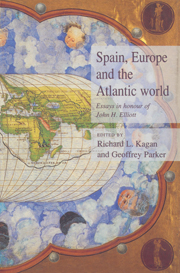Book contents
- Frontmatter
- Contents
- Notes on contributors
- Acknowledgements
- List of abbreviations
- Sir John Elliott: an appreciation
- Introduction
- PART I Power and propaganda: the world of the court
- PART II The pattern of society: community and identity in Habsburg Spain
- 4 Toledanos and the kingdom of Granada, 1492–1560s
- 5 Castile, Spain and the monarchy: the political community from patria natural to patria nacional
- 6 Aragonese constitutionalism and Habsburg rule: the varying meanings of liberty
- 7 Patriotism in early modern Valencia
- 8 The mental world of Jeroni Pujades
- 9 Centring the periphery: the Cerdanya between France and Spain
- PART III Spain and its empire
- Index
8 - The mental world of Jeroni Pujades
Published online by Cambridge University Press: 04 August 2010
- Frontmatter
- Contents
- Notes on contributors
- Acknowledgements
- List of abbreviations
- Sir John Elliott: an appreciation
- Introduction
- PART I Power and propaganda: the world of the court
- PART II The pattern of society: community and identity in Habsburg Spain
- 4 Toledanos and the kingdom of Granada, 1492–1560s
- 5 Castile, Spain and the monarchy: the political community from patria natural to patria nacional
- 6 Aragonese constitutionalism and Habsburg rule: the varying meanings of liberty
- 7 Patriotism in early modern Valencia
- 8 The mental world of Jeroni Pujades
- 9 Centring the periphery: the Cerdanya between France and Spain
- PART III Spain and its empire
- Index
Summary
Jeroni Pujades was born in Barcelona in 1568. His father, Miquel Pujades, was a well-known lawyer and chronicler from Figueres, a town in the Empordà, a district in northern Catalonia bordering on France. Jeroni studied in Barcelona, and then in 1585 enrolled in the nearby university of Lleida, whence he emerged as a doctor in civil and canon law six years later. Upon returning to Barcelona he taught canon law in the municipal university, and soon married the daughter of a judge in the Audiència, or royal court of appeals. In 1604 the duchess of Cardona appointed him to the post of Assessor del Comtat d'Empùries, the chief legal officer for the seigneurial jurisdiction of the leading aristocratic family in the principality. His new job obliged him to leave Barcelona to take up his duties in the town of Castelló d'Empùries. He resigned in 1609, however, and returned to his native city.
The next two decades found him immersed in the legal and political life of Barcelona: he served actively on the Consell de Cent, or city council, and held various minor posts in the municipal administration. In 1621 he weighed into the controversy surrounding the legality of the viceroy's powers following the death of Philip III by publishing a brief favouring the royal cause. In the same year, however, he returned to Castelló. Both the profligate behaviour of his eldest son, and his failure to obtain compensation (such as a judgeship in the Audiència) for his efforts on behalf of the crown, had taken a heavy toll on the family economy.
- Type
- Chapter
- Information
- Spain, Europe and the AtlanticEssays in Honour of John H. Elliott, pp. 211 - 226Publisher: Cambridge University PressPrint publication year: 1995



